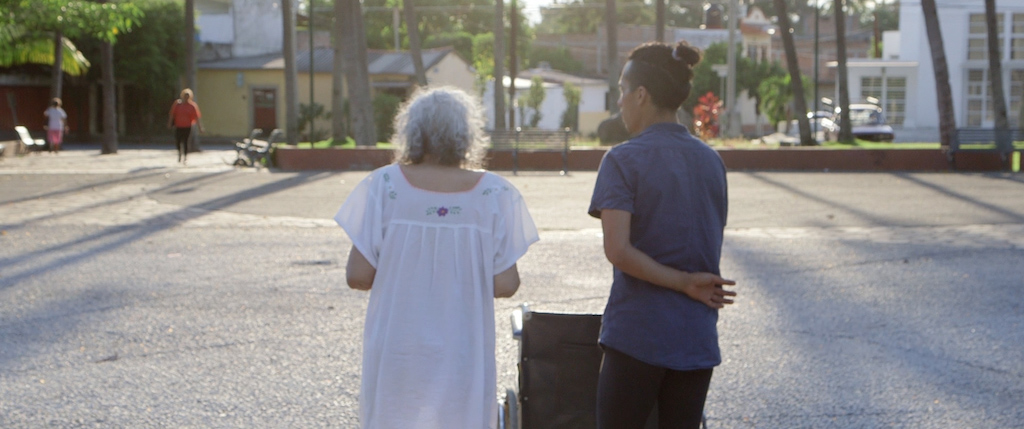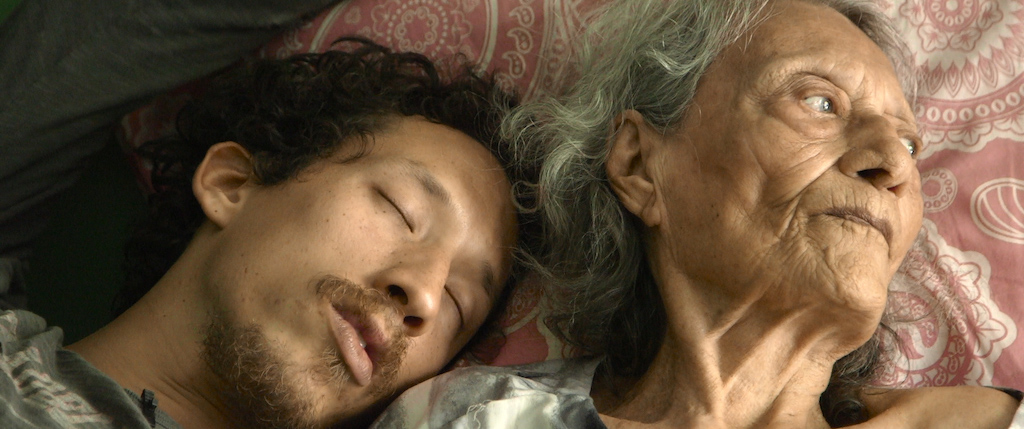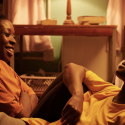What a wonderful little gem! This documentary by American duo Erick Stoll and Chase Whiteside lasts 76 minutes, but I could happily have watched it for hours. The film addresses a desperately sad and difficult issue – what to do with an elderly relative who suffers from dementia and needs constant care – but does so with such a light and compassionate touch that it is pure joy.
When 93 year old América fell out of bed, her neighbours heard her cries and called the police. Luis, her son and sole carer, was out at the time, so they charged him with neglect and put him in jail. América’s grandson Diego comes to the rescue and, along with his brother Rodrigo, undertakes to look after his grandmother. This is no easy matter since the old woman is unable to wash or dress herself and is often confused about what is going on around her.
The film focuses mainly on the relationship between the delightful but vague América and Diego, whose sympathetic care of his grandmother is a pleasure to witness. He is able to enter her world and give her peace of mind amid the confusion. We first meet them lying on América’s bed. ‘Do you know who I am ?” Diego asks as he showers her with kisses. “This young lad,” she replies stroking his goatee beard, “is her favourite son.” “No, I’m your grandson!” he laughs and shows her a family photograph to prove it. “What a joy you are,” she exclaims. “You have so many memories of us.”
América may have dementia but she hasn’t completely lost her marbles. She has moments of extreme clarity. “What is he doing?” she asks looking at the camera. “He’s recording. You’re a star !” comes the reply. “A startled star,” she quips. The camera is soon forgotten, though, as it continues over the next three years to follow their lives in Colima, Mexico. The result is an uplifting tale of young lives being put on hold for the benefit of their aged grandmother and being immeasurably enriched by it.
 The charismatic Diego is a natural in front of the camera. He may have given up a carefree bachelor life to care for his grandmother, but his sunny disposition and light hearted approach turn even the most undesirable tasks – like solving the problem of América’s constipation – into interesting challenges. Rodrigo is willing to do his bit, but he is motivated more by duty than affection and has little rapport with his grandmother. The bothers’ conversation revolves around how to get Luis out of jail (bribing the judge turns out to be the solution) and, meanwhile, how much they can do for América.
The charismatic Diego is a natural in front of the camera. He may have given up a carefree bachelor life to care for his grandmother, but his sunny disposition and light hearted approach turn even the most undesirable tasks – like solving the problem of América’s constipation – into interesting challenges. Rodrigo is willing to do his bit, but he is motivated more by duty than affection and has little rapport with his grandmother. The bothers’ conversation revolves around how to get Luis out of jail (bribing the judge turns out to be the solution) and, meanwhile, how much they can do for América.
After six months, the going gets tough and they persuade their older brother Bruno to join them. They are all trained acrobats and we see them form a human tower with Rodrigo as the strong man supporting his siblings. The column unwittingly acts as a metaphor; it demonstrates the collaboration between them that Diego relishes and hopes to continue, but also reveals how dependent this is on Rodrigo providing a solid financial foundation.
Money is the cause of a row which later erupts between Diego and Bruno; the fight that follows feels somewhat staged and prompts one to wonder how much the presence of the camera influences the brothers’ behaviour. One of the most delightful moments is when Diego and Bruno take América out while riding their unicycles. Bruno pushes her wheelchair from behind while Diego rides gleefully around them in circles.
 As well as caring for América, Diego is happy to spend time with her (pictured below) sleeping, chatting and performing for her on the aerial silks hanging from the mango tree in the yard. The others are less patient. One of the more harrowing scenes takes place in the park (pictured above). Bruno tries to teach his grandmother to walk unaided. Afraid of falling, she vehemently protests, but he doggedly persists until eventually the police intervene and an official enquiry follows. Fortunately it goes nowhere, but it rachets up the tension and, when their father finally gets out of prison, things rapidly fall apart. Luis wants nothing to do with América’s care and Rodrigo has similarly had enough; he now wants to devote his time to his wholesale business.
As well as caring for América, Diego is happy to spend time with her (pictured below) sleeping, chatting and performing for her on the aerial silks hanging from the mango tree in the yard. The others are less patient. One of the more harrowing scenes takes place in the park (pictured above). Bruno tries to teach his grandmother to walk unaided. Afraid of falling, she vehemently protests, but he doggedly persists until eventually the police intervene and an official enquiry follows. Fortunately it goes nowhere, but it rachets up the tension and, when their father finally gets out of prison, things rapidly fall apart. Luis wants nothing to do with América’s care and Rodrigo has similarly had enough; he now wants to devote his time to his wholesale business.
Diego and Bruno move out with their grandmother and continue to look after her until the end of her life. The last time we see her she is lying beside Diego singing along with gusto to a pop song playing on the radio. Her grandsons have introduced moments of clarity and happiness to her final years. As well as being a delight to watch, they are an example to us all.














Add comment